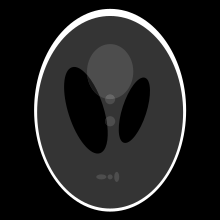The Shepp–Logan phantom is a standard test image created by Larry Shepp and Benjamin F. Logan for their 1974 paper "The Fourier Reconstruction of a Head Section".[1] It serves as the model of a human head in the development and testing of image reconstruction algorithms.[2][3][4]

Definition
editThe function describing the phantom is defined[1] as the sum of 10 ellipses inside a 2×2 square:
| Ellipse | Center | Major Axis | Minor Axis | Theta | Gray Level |
|---|---|---|---|---|---|
| a | (0,0) | 0.69 | 0.92 | 0 | 2 |
| b | (0,−0.0184) | 0.6624 | 0.874 | 0 | −0.98 |
| c | (0.22,0) | 0.11 | 0.31 | −18° | −0.02 |
| d | (−0.22,0) | 0.16 | 0.41 | 18° | −0.02 |
| e | (0,0.35) | 0.21 | 0.25 | 0 | 0.01 |
| f | (0,0.1) | 0.046 | 0.046 | 0 | 0.01 |
| g | (0,−0.1) | 0.046 | 0.046 | 0 | 0.01 |
| h | (−0.08,−0.605) | 0.046 | 0.023 | 0 | 0.01 |
| i | (0,−0.605) | 0.023 | 0.023 | 0 | 0.01 |
| j | (0.06,−0.605) | 0.023 | 0.046 | 0 | 0.01 |
References
edit- ^ a b Shepp, Larry A.; Logan, Benjamin F. (June 1974). "The Fourier Reconstruction of a Head Section" (PDF). IEEE Transactions on Nuclear Science. NS-21 (3): 21–43. Bibcode:1974ITNS...21...21A. doi:10.1109/TNS.1974.6499235. Archived from the original (PDF) on 2016-03-04.
- ^ Ellenberg, Jordan (February 22, 2010). "Fill in the Blanks: Using Math to Turn Lo-Res Datasets Into Hi-Res Samples". Wired. Retrieved 31 May 2013.
- ^ Müller, Jennifer L.; Siltanen, Samuli (2012-11-30). Linear and Nonlinear Inverse Problems with Practical Applications. SIAM. pp. 31–. ISBN 978-1-61197-233-7. Retrieved 31 May 2013.
- ^ Koay, Cheng Guan; Sarlls, Joelle E.; Özarslan, Evren (2007). "Three-Dimensional Analytical Magnetic Resonance Imaging Phantom in the Fourier Domain" (PDF). Magnetic Resonance in Medicine. Vol. 58. pp. 430–436. Archived from the original (PDF) on 2013-02-16.